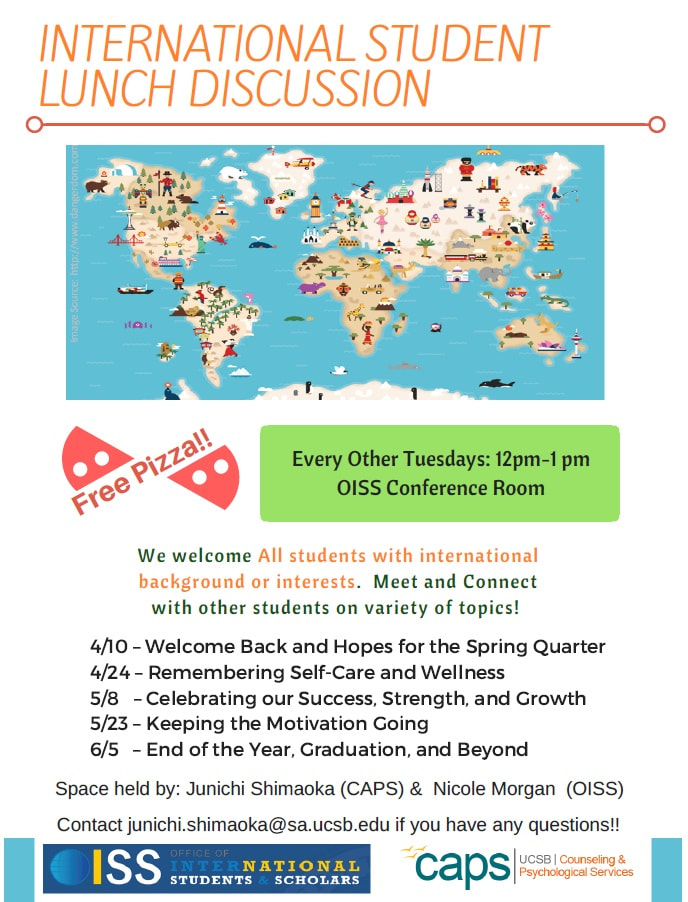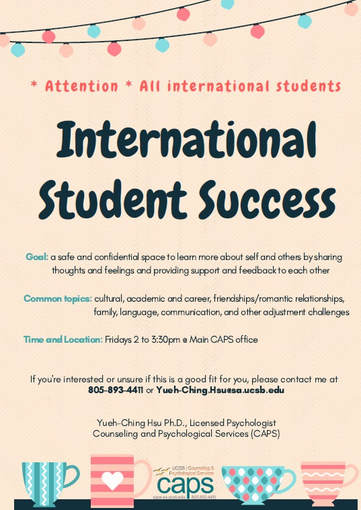Creating A Sense of Safety When the World Feels Unsafe
Safety is the experience of being protected from danger and hurt. Within a safe environment, we can relax and be ourselves because we know that our well-being is secure. We feel free to take manageable risks toward growth and change. But the political climate and recent legislative policies have lead many in the international student community to live in daily fear and uncertainty. They feel targeted and traumatized, and experience discrimination and harassment.
Feeling safe is at the core of healing. Although there is much uncertainty, you can experience moments of safety with a trusted therapist, a close friend/partner, or through sharing your experiences with another person impacted by the political climate, legislative policies, and social biases. Below are important strategies for feeling establishing a greater sense of safety when the world feels threatening.
Feeling safe is at the core of healing. Although there is much uncertainty, you can experience moments of safety with a trusted therapist, a close friend/partner, or through sharing your experiences with another person impacted by the political climate, legislative policies, and social biases. Below are important strategies for feeling establishing a greater sense of safety when the world feels threatening.
- FIND ALLIES AND BUILD A COMMUNITY OF SUPPORT. The university community is filled with groups that are here to support you in the many ways you need. From peer groups to faculty and staff support services to help you with academic, financial, health, and safety concerns, we have a community waiting to help. Check out the Office of International Students & Scholars (OISS) to find contacts in our community.
- KNOW THE INFORMATION TO PROTECT YOUR VISA STATUS. Your visa comes with certain rules and restrictions, and to maintain your status it is helpful to be aware of these rules and limitations. Check out the basics at OISS to help you to stay within these limits and feel more secure about your visa status.
- KNOW YOUR RIGHTS. Feeling safe and secure is also about being prepared. Know your rights and resources to call if you find yourself in a situation that threatens your safety or the safety of others. Contact OISS at (805) 893-2929 or [email protected].
- ESTABLISH AN EMOTIONAL RITUAL. Establishing an emotional ritual is your opportunity to carve out time in your day that is just for you. This is your self-care time. You might want to play music, light a candle, surround yourself with objects that help you feel soothed (e.g., a special object given to you by someone you love). You might want to wear your comfiest pajamas. It might be enough for you to make yourself a cup of tea before you begin the day. Your ritual can be complex or basic. The important thing about creating a ritual for safety is that it has personal meaning that you can use over and over. It helps assure that you have a few minutes for yourself every day to journal, breathe, or just sit in silence.
- FIND A SAFE SPOT TO JOURNAL YOUR THOUGHTS AND FEELINGS. Choosing a special place to work on journalling topics can decrease your chances of being interrupted and boost your feelings of safety. Think about the places where you feel particularly relaxed and the most calm. The important thing is that you seek a spot where you can be the most at ease, the most centered on yourself and the task in front of you.
- FIGURE OUT THINGS YOU CAN CONTROL AND FIND WAYS TO LET GO OF EVERYTHING ELSE. Staying immersed in worry only serves to compromise your health and make you less resilient to challenges that come your way. Find ways to tolerate the uncertainty of things you can't control. Being active and working toward your goals can give you hope. So, work towards staying present and engaged in your daily life activities.
Common Reactions to the Current Social-Political Climate
The recent rise some political and social groups have emboldened new legislation to discriminate against international students and immigrants from other countries. As a result, many students are experiencing increased fear for themselves and other members of their community.
To survive and thrive amidst bullying, threats, discrimination, and harassment, students need to be able to recognize the common signs and signals of distress, pay attention to these signals (not ignore them!), and actively employ strategies to reduce their distress. Further, making regular time for self-care and reaching out to support and care for one another will build a strong foundation of resilience.
To survive and thrive amidst bullying, threats, discrimination, and harassment, students need to be able to recognize the common signs and signals of distress, pay attention to these signals (not ignore them!), and actively employ strategies to reduce their distress. Further, making regular time for self-care and reaching out to support and care for one another will build a strong foundation of resilience.
Common symptoms of distress when students experience discrimination and/or harassment
|
Acute Stress & Trauma:
|
Importance of Paying Attention to Signals of Distress (“Red Flags”)
|
Most people know the symptoms that tell them they are distressed, but all too often they ignore their symptoms (“I don’t have time to feel bad!) Think of these symptoms as the early warning signs--the “red flags”--that tell you to stop and take a moment to consider how to handle whatever is going on. By attending to these early signs, you may be able to prevent yourself from feeling much worse later.
Chronic stress can lead to devastating longer-term health implications such as heart disease, asthma, diabetes, and post-traumatic stress disorder, it is important to work towards reducing your level of distress. |
What can be done to help relieve your distress?
- Practice good self-care. Put energy into healing and feeding your soul. Taking care of your mind and body will help you to reduce stress and build resilience. Exercising, eating a balanced diet, and getting plenty of rest are essentials, but perhaps you could also consider trying mindfulness exercises and/or yoga, .
- Join circles of support. Finding support from others who experience similar concerns helps students to feel understood, cared for, and a sense of greater safety. Sharing your thoughts and feelings about your experience can provide an important opportunity to redefine your narrative and feel more empowered. Check out the Office of International Students & Scholars (OISS) and the International Student Association to find community.
- Find ways to get back to your routine of being a student. Your routine can create purpose and structure in your day and can feel stabilizing in an unstable time. Be aware that you might need to let up on the pace a bit...that's ok. Listen to and be patient with yourself.
- Find sources of hope. Look to what inspires you--music, books, people--to help you find your strength and bring you peace each day.
- Tap into your faith/spirituality if this is important to you. Engaging in prayer and connecting to your spiritual beliefs can provide you a sense of higher purpose and help to solidify your resolve in these trying times.
- Turn your energy into activism if you feel safe to. For some students, getting involved in social justice organizations and other advocacy efforts helps them to feel more control and efficacy. Make sure to take time to step away from this when you need to, as it can also feel overwhelming to be immersed in the injustices of the world and it can sometimes feel unsafe to put yourself on the line. Take a break and come back.
Building Resilience
|
Resilience is the capacity to withstand and bounce back from significant stress and/or catastrophe. Humans have great capabilities to adapt and overcome risk and adversity, and rebuild their lives even after difficult circumstances or devastating events.
Being resilient doesn’t mean going through life without experiencing stress and pain. People feel grief, sadness, and a range of other emotions after adversity and loss. The road to resilience lies in working through your emotions about painful events and gathering sources of support to help you navigate that path.
|
Tips to Help Each Other Out
|
Assembling Your Support Team
Navigating a new country, a new culture doesn't mean you need to do that on your own. Check out OISS, the MultiCultural Center, and our many programs at CAPS for International Students! Each has programming specifically geared toward international students and can help you to make your experience here at UCSB at good one.
|
[email protected] SRB Room 3130 (805) 893-2929 OISS provides international students with immigration support, advising, and cultural programming, and connects students to each other!
|
mcc.sa.ucsb.edu UCen Room 1504 (805) 893-8411 The MCC provides a space for many students from various communities to have critical conversations, a place to study, hold meetings, and have social events to connect students to each other!
|
(805) 893-4411
|
All registered UCSB students are eligible for services at CAPS. We provide individual therapy and groups serving international students. All therapists are trained to provide support to international students, but you may request to work with a therapist who focuses on providing support to the international student population and/or speaks your native language. We currently have therapists who conduct sessions in 7 languages, including English, Spanish, Mandarin, Cantonese, Taiwanese, Japanese, and Danish. Give us a call to learn more.
|
Proudly powered by Weebly







